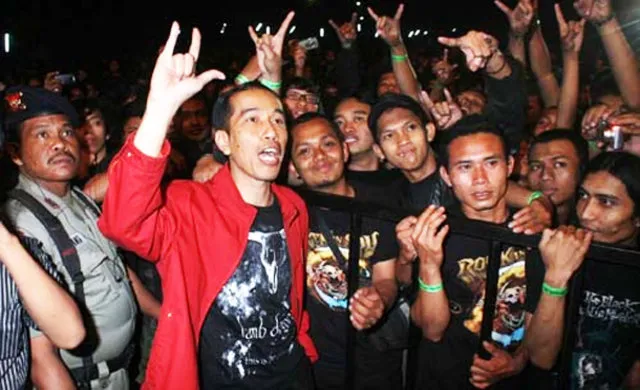
In the mid-1990s, Indonesia’s authoritarian regime viewed extreme metal as a direct challenge to its enforced ideals of harmony and social stability. Live metal concerts were banned, and the government under President Suharto actively reinforced stereotypes of metalheads as communist-affiliated “folk devils”, a narrative perpetuated via mass media, government institutions, and religious leaders. This systematic marginalization pushed extreme metal to the fringes of the national music scene, forcing musicians and fans to rely on local communities in Yogyakarta, Jakarta, Bandung, and Bali—not only as spaces for musical expression but also as nodes for sustaining social networks. In response, extreme metal subcultures adapted their resistance strategies, embracing verbal and sonic transgressiveness, organizing independent do-it-yourself (DIY) gigs and independent recording and distribution, and maintaining strong intercity connections that kept the musical movement alive.

Since the fall of Suharto’s authoritarian regime in 1998 and the subsequent period of Reformasi (Reformation), the Indonesian government’s relationship with extreme metal subcultures has shifted. No longer vilified as a threat to social order, extreme metal is now viewed as a marketable commodity aligned with the country’s creative economic agenda. This shift is evident in the rapid expansion of regional metal music festivals that regularly draw thousands of fans, often sponsored by cigarette companies, mainstream clothing brands, and beverage corporations. Additionally, some Indonesian metal bands have secured grants from state-funded projects, enabling them to perform at international festivals and further integrate into the global metal scene.


Indonesia has emerged as a significant hub for large-scale heavy metal festivals, most notably Hammersonic–recognized as Southeast Asia’s largest annual heavy metal music festival–which most recently took place in Jakarta in May 2024 and is slated to return in 2025. This growing acceptance of the genre reflects a broader cultural shift, one that reaches even the highest levels of government. Former President Joko Widodo—widely known as Jokowi—has openly expressed his enthusiasm for heavy metal, signaling a rare alignment between subcultural music scenes and political leadership. As Pri Ario Damar, Dean of Performing Arts at Institut Kesenian Jakarta (Jakarta Institute of the Arts), explains, “Indonesia is a moderate Muslim country, which is why we’re more open to foreign influences, including heavy metal music, compared to some more conservative nations.”
Whether this openness will persist remains uncertain, particularly given Indonesia’s political trajectory. Elected in 2014 on a wave of reformist optimism, Jokowi eventually came to embody the dynastic and anti-reform politics reminiscent of earlier regimes. His successor, Prabowo Subianto, is a former military general who served under Suharto.
This according to “From our own voices: The meaning making of subculture among extreme metal musicians in Indonesia” by Oki Rahadianto Sutopo and Agustinus Aryo Lukisworo (Metal music studies 9/3 [2023] 359–367; RILM Abstracts of Music Literature, 2023-20530).
The photo at the beginning of this piece is of the hijab-wearing, female metal trio Voice of Baceprot, the first Indonesian band to perform at the 2024 Glastonbury Festival in the U.K.
Below, a vlog of an Indonesian metalhead’s journey to Hammersonic 2024.
Related Bibliolore posts:
https://bibliolore.org/2017/10/23/heavy-metal-and-antiquity/
https://bibliolore.org/2015/01/06/heavy-metal-cookbooks/
https://bibliolore.org/2018/07/02/karinding-attacks-heavy-metal-bamboo/
https://bibliolore.org/2025/02/28/nusantara-heavy-metal-and-malaysias-long-hair-ban/


